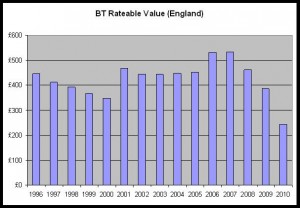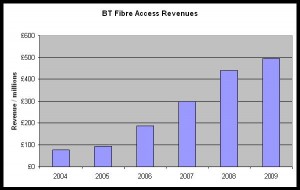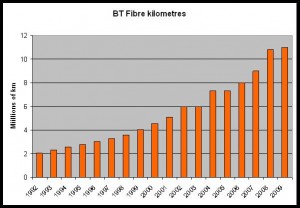The Digital Dales Colloquium was held at Timico HQ in Newark on Friday and packed out the main lecture theatre. With the focus of how to get rural areas onto the internet much of the meeting was spent debating the lack of level playing field when it comes to bidding for projects that involve European funding.From a third party perspective BT appears to have much of this stitched up because their existing deal on rates paid for their network infrastructure is based on a volume play. This means that BT can assume lower costs for fibre runs where new market entrants putting fibre in the ground perhaps for the first time incur much higher charges. The chart below, pinched from network provider Vtesse Networks MD Aidan Paul’s presentation, shows how the rates applied to fibre vary depending on how many fibres you have in the ground on a given route. Clearly if you are an incumbent operator with a large market presence this method of rating is going to give you a significant competitive advantage over a new player. The figures represent rateable value applied to each kilometre of fibre.

The weird nature if the curve doesn’t inspire confidence. Moreover as a separate discussion point these rateable values are quite high numbers and in my mind represent an impediment to the competitiveness of UK plc in general. What is more surprising is that despite the growth in BT’s fibre business the actual rateable value of the corporation has dropped considerably. Your guess is as good as mine as to why this is though no doubt BT has very competent staff involved in its negotiations with the Valuation Office.



Vtesse has been involved in a long running litigation to try and redress this situation. Lord Justice Sedley recently pronounced: “It is now evident . . . that Vtesse has a tenable argument that, contrary to the VO’s case and BT’s claims, the 2008 Ofcom report shows that it is possible not only to disaggregate BT’s rateable holdings but to assign a hypothetical rental value to their fibre-optic cables. If that can be done, there is arguably a gross disparity in BT’s favour between the rateable value of its and Vtesse’s cables. . . . By contrast, the injustice of allowing the continuance of what may be a radical inequity in the rating system will go unredressed by the proposed disposal.” The BIS select committee Chairman Peter Luff MP has also spoken out about this: “Government intervention at this stage should concentrate on changing policies to encourage investment in the NGA market. Perhaps the best example of this is the business rating system which currently discriminates in favour of BT and against its competitors. We believe that the Government should consider a reduction, or even a temporary removal, of business rates on fibre optic cable. This would be a more effective use of limited public sector funds than direct financial intervention.” In other words removing business rates on fibre runs would be a good way of promoting investment in connectivity for rural areas. I don’t have a handle on the relative numbers but I would say this was also a much fairer way of funding investment in NGA than the 50 pence phone line tax.

12 replies on “Fibre rates inequity iniquity”
Many thanks to Timico for the generous hospitality.
Korea removed property rate on fibre and look what that enabled?! Just a reminder, VOA meeting on Monday at BSG Intellect office in Russell Square from 2-5pm for everyone interested in this issue.
Thanks to Trefor for hosting another seriously effective Digital Dales Colloquium, well worth the time and modest cost to participate.
As a single issue to rally and invigorate Next Gen Access in the the UK, the removal of business rates for first mile fibre has much to commend it
Alternatively another effective NGA catalyst would be the direction by Government in the National Interest to mandate the structural separation of Openreach from BT Group, if that is what it takes to lift Britain out of Digital Poverty now.
VOA are talking of creating a ‘per premise connected’ for altnet operators, not dis-similar to the Cables £7.50 per home passed.
The removal for rates all together looks ambitiuos as it would require rates gets removed from all comms assets like mobile masts, Cable TV and other first mile providers.
Vtess have being trying to show that RATES are unfairly applied which the VOA evidence shows otherwise and the European ruling also showed otherwise, hence the need to show that RATES are unfair overall, which probably is the case but this is putting at risk about £1bn of annual tax yield from this sector alone.
There is a real issue that as the cost per bit drops and drops, the RV ought to drop, but the Rates system at best takes enormous time to catch up with this reality.
One one hand the government is spending millions to try to get folk online, and on the other hand it is impeding roll out of next gen by this stupid tax. It doesn’t make sense to me. The one action they could take by removing this tax on new fibre would mean that connectivity would be brought to the whole country instead of twice to the virgin footprint?
chris
I’d also like to thank Timico for their fine hospitality. Everyone there was very kind and helpful to us and a credit to the company.
Aidan Paul’s presentation made it quite clear that the rates system is unfair and unequitable in this country. Increasing political pressure to make shanges that will level the playing field is needed now, as we head towards an election and a potential new government. Together we have a strong voice. Let’s use it.
When is someone going to bite the bullet, move away from the dogma, and realise that a publicly-owned national fibre network is the only realistic way forward? By all means bring in the private sector to maintain it but the fibre should be leased back to TV and Telcos, with an enabling low-cost national infrastructure for shared public sector IT infrastrucure.
@DavidGale Why not community owned? Why national? The electricity in my village was originally provided from the water wheel owned within my community and the water came down trenches from the fells dug by our community. This was long before even Manchester had electrickery.
Once it was nationalised, with the creation of Water Boards etc in the 50s, they removed the access to our local water which is as sweet today as I am sure it was at the beginning of the 20th century when this activity happened, and now we get water down a big fat pipeline from the Lake District whilst our local water goes unused. In addition, we pay god knows how much on our water bills for maintenance of pipes that leak in the many miles they now need to traverse, have nothing to do with us at all, and need never feed this village with H20.
@ Lindsey Annison That’s fine providing that you’re prepared to keep paying for the £100Ms of waste in public sector IT. (the blog at http://www.sitfo.wordpress.com might be a useful reference) If public sector fibre is dealt with effectively, you’ll get a national fibre network anyway.
For the moment, suppliers are happy to keep things fragmented because there’s more profit that way. Civil servants and junior ministers are discouraged from thinking strategically because of the same flawed tick-box, tactical culture that dominates every other aspect of government. (further reading at: http://www.davidgaleindependent.org.uk)
Sadly, there are those who would keep the disjointed approach for personal and corporate gain. I accept that it’s a deeply unsexy subject for the electorate, but the hidden costs of public sector IT makes the MPs expenses scandal look like small change.
US proposals to spend $4.5 billion a year on national fibre network: http://government.zdnet.com/?p=7936&tag=nl.e589
Tweet me at: http://twitter.com/DavidGaleUK
[…] already blogged that by last year BT in the UK had 11 million kms of fibre in the ground. I would expect that Al Gore might consider the Information Superhighway to well and […]
48 fibres and they pay you? Is this graph right?
[…] upshot of this is that at a time when industry has been crying out for a level “rates” playing field the VOA has made it an even more unequal commercial battle in […]